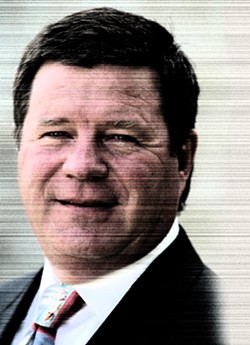Sheriff Hedges leaves a sordid legacy
Six candidates for sheriff promise to restore public faith in the department
By Robert A. Mcdonald[{
"name": "Ad - Medium Rectangle CC01 - 300x250",
"id": "AdMediumRectangleCC01300x250",
"class": "inlineCenter",
"insertPoint": "8",
"component": "2963441",
"requiredCountToDisplay": "12"
},{
"name": "Ad - Medium Rectangle LC01 - 300x250",
"id": "AdMediumRectangleCC01300x250",
"class": "inlineCenter",
"insertPoint": "18",
"component": "2963441",
"requiredCountToDisplay": "22"
},{
"name": "Ad - Medium Rectangle LC09 - 300x250",
"id": "AdMediumRectangleLC09300x250",
"class": "inlineCenter",
"insertPoint": "28",
"component": "3252660",
"requiredCountToDisplay": "32"
}]
There is something strange about the campaigns by the six candidates for San Luis Obispo County Sheriff. Yes, the six have answered the same questions candidates for any sheriff’s office have been asked since the beginning of the republic and yes, the race has all the conventional trappings, including fundraisers, picnics, and more than 20 debates. But there is something different here, something dark, a shadow cast by the departing sheriff, Pat Hedges: a legacy of deception, mismanagement, and wayward policing. Almost every resident interviewed for this article, whether at candidates’ debates or on the street, said they were deeply troubled about Hedges’ leadership.
Tuned in
It’s clear the candidates have listened. They speak often of “restoration of trust” and vow “things will be different when I am sheriff.” One candidate, Ben Hall, who’s a commander in the sheriff’s department, said during a forum: “I have no excuse for bugging other employees. There is no excuse for employee reps sleeping with county representatives. I can’t wind back the clock, but remember I am not the person who was responsible for these acts and that will not happen in my reign.”
Eavesdropping for ridicule
Hall’s boss did indeed wiretap one of his own employees. On August 17, 2007, Chief Deputy Gary Hoving discovered his boss, Hedges, had secretly videotaped and recorded him the previous October. Hoving filed a $1.25-million lawsuit against the sheriff for violating his privacy. The resulting case revealed much about how Sheriff Hedges ran his department.
Hedges claimed he and his undersheriff Steve Bolts bugged Hoving because another employee claimed Hoving had engaged in criminal behavior. Hedges later admitted those suspicions were groundless.
Hedges might have been prosecuted: Under state law, it’s illegal to eavesdrop or record a conversation without the consent of those involved. A first offense is a misdemeanor, punishable by a fine of up to $2,500 and up to a year in jail. One of the few exceptions to unauthorized recording is when a police officer is conducting a criminal investigation. But Hedges never substantiated there had ever been an official investigation and did not consult with legal counsel until many months after the incident. Moreover, he and Bolts installed the bugging devices themselves.
If there were going to be an official investigation of a sheriff’s deputy, by convention an internal affairs section would handle it. However, the sheriff’s department doesn’t have an internal affairs office; Hedges eliminated the unit.
Hedges publicly claimed he had done nothing wrong. The story was different, however, when he had to testify under oath. According to court documents, when Hedges informed Hoving he had wiretapped him, he told him he may “have been a victim of a crime.”
According to the court document, the sheriff then began to cry.
Hedges next told Hoving he had been cleared of any wrongdoing and the surreptitious tape could be used as a “training video.”
Millions spent in settlements
Hedges tried to sidestep a scandal. He filed a lawsuit to prevent county employees from discussing the story. Gag orders are rarely imposed in such cases, though they are not unprecedented. A judge turned Hedges down.
As county and state investigations churned on, the facts about the bugging came out. In an apparent act of contrition, Hedges docked his own pay by a day’s salary ($700) apparently to compensate for the day he’d spent bugging Hoving.
In the end, the county capitulated and cut a deal with Hoving, settling for $660,000. Insurance paid most of that but the investigation of Hedges cost $117,000.
Lawsuits against the sheriff’s department during Hedges’ administration have cost the county several millions of dollars: at the minimum, $3.4 million dollars in settlements.
The county paid $2 million for a brain injury suffered by Gerald Bernales after he was stopped for speeding. Accounts differ as to exactly what happened, but what is known is Berales suffered permanent brain damage during his encounter with sheriff’s deputies.
The county had to pay $650,000 to settle a lawsuit over the wrongful death of Jay Vestal. Vestal was killed by Sheriff’s deputies outside his trailer when he was in arm restraints during an arrest.
The county paid $50,000 to settle a wrongful death suit for the death of Jordan Maitlen. Deputies had hogtied him, and he suffocated after a towel was wrapped around his face. Hedges at the time said he was not sure whether hogtying violated the policy of his department. Three wrongful death suits were filed against the sheriff’s deputies within a two-year period.
Though Hedges was not directly implicated in those tragedies, public safety officials and experts have said the leader of a law-enforcement organization is responsible for the behavior of the personnel he supervises.
“It’s a bit like a military organization,” said a retired police officer who preferred to keep his name out of the present election. “You’re responsible for your guys. If they are trained properly, then they will perform the right way. If they don’t, then they haven’t been trained right and bad leadership is the reason. Especially if it keeps happening.”
Federal enforcement, Hedges style
During the late morning of March 29, 2007, sheriff’s officers and the U.S. Drug Enforcement Administration executed a federal search warrant on Central Coast Compassionate Caregivers, a medical cannabis dispensary in Morro Bay owned by Charles Lynch. Lynch’s dispensary was operating under California law and had the blessing of local officials, who had granted him a business license and even posed for a ribbon-cutting ceremony when he opened it.
The dispensary followed the rules established under Proposition 215, the medical cannabis law approved by California voters in 1996.
Hedges’ spokesman, at the time Sergeant Brian Hascall, explained that the sheriff’s department had a duty to uphold both state and federal law, and pointed to the oath of office that requires them to support and defend the Constitution of the United States of America as well as the Constitution of the State of California. “That’s where the conflict between the federal law and the state law becomes such a problem,” Hascall said.
It quickly became apparent that Hedges’ interpretation of his role in enforcing federal law was unique among law enforcement officials in the state. Though the feds had raided clinics that did not conform to California medical cannabis law, this was reportedly the first raid on one that had complied with state requirements. The justification was “drug dealing” had occurred at the clinic.
The sheriff’s department had put the clinic under surveillance for more than a year; an “undercover” police van was parked down the street and was observed many times by dispensary customers. Deputies recorded the license plate numbers of clinic users. And when the raid occurred, they took down the names and addresses of customers who arrived throughout the day. The raid bagged more than Charles Lynch; it netted the clinic’s records listing the numbers and addresses of the dispensary’s customers.
Lynch was never charged with a state drug violation. The raid infuriated two groups that usually don’t see eye to eye: medical cannabis advocates, and conservatives who saw the hand of big government in the machinations of the local sheriff. In their view, Hedges had placed himself above the law of the state and therefore the people of California.
Eyebrows were raised when the sheriff’s spokesman commented about the sale of medical cannabis. Hascall said the raid on Lynch’s dispensary could hamper efforts to open other medical cannabis dispensaries in the county. “Obviously this is a rather large setback for those businesses,” he said. “I still feel the conflict between [state law] and federal law needs to be resolved.”
Lynch was arrested at his Arroyo Grande home on July 17 and was taken to the Metropolitan Detention Center in Los Angeles on federal drug charges, the most serious of those, and in the end the most damning, being selling marijuana to a minor.
Under California law, anyone over the age of 18, with a doctor’s note, can join a medical cannabis cooperative. Federal law, on the other hand, comes down hard on what the federal government sees as drug sales to minors.
Lynch, who had no criminal record when he was arrested, became the poster boy not only for debates about medical cannabis, but also for what many saw as overreaching by a rogue sheriff who lorded his personal views over the laws of the state of California.
Lynch was convicted in the summer of 2009 on five counts related to growing and distributing marijuana and was sentenced to a year and a day in federal prison. That sentence is still under appeal, probably thanks to a policy change by the Department of Justice under the Obama administration that renounces federal interference with medical cannabis dispensaries that operate legally under state mandates. The cost of Hedge’s yearlong investigation has never been released.
California law regarding medical marijuana has had little evident influence on the sheriff’s department. Deputies have arrested medical cannabis patients, regardless of their adherence to state law. Medical cannabis users have been forced to obtain court orders to get their confiscated medicine returned. In some cases, they learned the department had “accidentally” destroyed it.
Union split
The rank and file of the sheriff’s department has grown discontent under Hedges. The department union, the Deputy Sheriff’s Association (DSA), split in February. Most of the 141 sheriff’s department sergeants and deputies broke off to start a new union, the Association of San Luis Obispo County Deputy Sheriffs (ASLO).
Though many of the issues that apparently divided the union seem unrelated to Hedges, the DSA and Hedges’ fate have long been intertwined. The union was a steadfast supporter of Hedges for election and it was widely perceived no candidate for sheriff could win without the support and financial resources of the DSA.
In the 2008 county supervisors’ election, the DSA threw its support behind liberal Adam Hill over conservative incumbent Jerry Lenthall. The endorsement was startling, because Lenthall was a retired San Luis Obispo city cop and was widely perceived as more sympathetic to the law-enforcement community.
Lenthall says he lost the DSA endorsement because he was against giving non-sworn officers the same retirement benefits—three percent at age 50—as officers who had front-line duties.
He said this was necessary because the “economic bubble was leaking” and the county was heading into difficult financial times.
Indeed Lenthall lost the election to Hill, the DSA’s candidate. This apparently upset many of the union’s members. Moreover, the DSA’s contract representative had been sleeping with the county’s negotiator, a relationship that did not inspire loyalty from the union’s rank and file.
Lenthall’s experience with the police union shows in part how Hedges managed to survive in office. Politicians know that challenging the sheriff’s department generally is a bad idea.
“No supervisor wants to be known for coming out against law enforcement,” said a county official who preferred to remain anonymous. “It’s a political loser in this county.” Several county officials (nearly word for word) echoed this sentiment.
Much of the power of the sheriff’s union is apparently broken because of the split. All the candidates have distanced themselves from the DSA. Even Ian Parkinson, the DSA’s pick for the next sheriff, has refused the union’s $10,000 campaign contribution.
All six candidates for sheriff seem united in one other way: They all pledge to make a clean break with the past. Each candidate pledges transparency, to restore integrity and dignity to the department, and restore public confidence.
Send comments via [email protected]
Latest in News
Comments
Showing 1-1 of 1
Readers also liked…
-

Coast Unified teachers upset over new position's salary and qualifications
Oct 20, 2022 -

SLO police identify alleged driver who hit and killed couple
Dec 22, 2022 -

When the levee breaks: Oceano residents, county officials walk a tightrope of regulations to manage Arroyo Grande Creek, which some say led to the levee's failure in January
May 18, 2023












